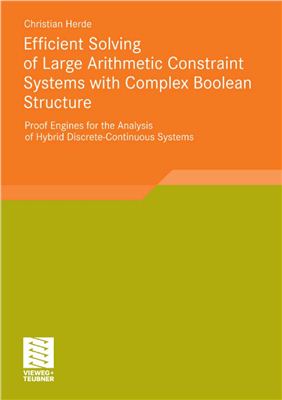Vieweg+Teubner, 2011. 163 p. ISBN:3834814946
Due to the growing use of more and more complex computerized systems in safety-critical applications, the formal verification of such systems is increasingly gaining importance. Many automatic and semi-automatic schemes for hardware and software verification ultimately rely on decision procedures for discharging the proof obligations generated during the verification process. Christian Herde deals with the development of such procedures, providing methods for efficiently solving formulae comprising complex Boolean combinations of linear, polynomial, and transcendental arithmetic constraints, involving thousands of Boolean-, integer-, and real-valued variables. Although aiming at providing tool support for the verification of hybrid discrete-continuous systems, most of the techniques he describes are general purpose and have applications in many other domains, like operations research, planning, software validation, and electronic design automation.
Due to the growing use of more and more complex computerized systems in safety-critical applications, the formal verification of such systems is increasingly gaining importance. Many automatic and semi-automatic schemes for hardware and software verification ultimately rely on decision procedures for discharging the proof obligations generated during the verification process. Christian Herde deals with the development of such procedures, providing methods for efficiently solving formulae comprising complex Boolean combinations of linear, polynomial, and transcendental arithmetic constraints, involving thousands of Boolean-, integer-, and real-valued variables. Although aiming at providing tool support for the verification of hybrid discrete-continuous systems, most of the techniques he describes are general purpose and have applications in many other domains, like operations research, planning, software validation, and electronic design automation.

